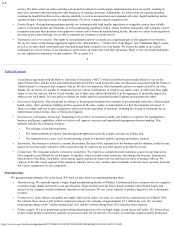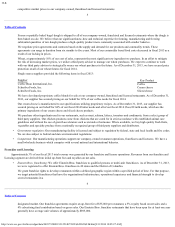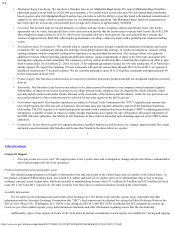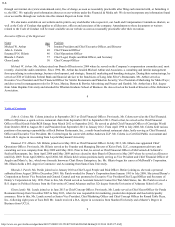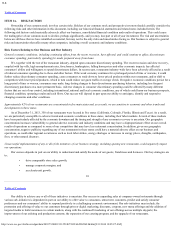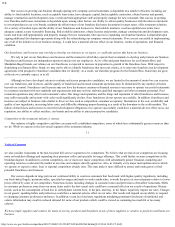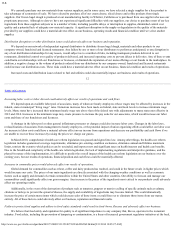Einstein Bros 2013 Annual Report Download - page 15
Download and view the complete annual report
Please find page 15 of the 2013 Einstein Bros annual report below. You can navigate through the pages in the report by either clicking on the pages listed below, or by using the keyword search tool below to find specific information within the annual report.
10-K
http://www.sec.gov/Archives/edgar/data/949373/000119312514073832/d629623d10k.htm[9/11/2014 10:05:27 AM]
Our management is responsible for establishing and maintaining effective internal control over financial reporting. Internal control over
financial reporting is a process to provide reasonable assurance regarding the reliability of financial reporting for external purposes in accordance
with accounting principles generally accepted in the United States. Because of its inherent limitations, internal control over financial reporting is
not intended to provide absolute assurance that we would prevent or detect a misstatement of our financial statements or fraud. Any failure to
maintain an effective system of internal control over financial reporting could limit our ability to report our financial results accurately and timely
or to detect and prevent fraud. A significant financial reporting failure or material weakness in internal control over financial reporting could cause
a loss of investor confidence and decline in the market price of our stock.
Risk Factors Relating to Our Indebtedness
We may not be able to comply with certain debt covenants or generate sufficient cash flow to make payments on our debt or to pay dividends to
our stockholders in the future.
Our current credit facility contains certain covenants, including certain financial covenants such as limitations on capital expenditures,
maintenance of the business, use of proceeds from sales of assets and consolidated leverage and fixed charge coverage ratios as defined in the
agreements. We are subject to multiple
17
Table of Contents
economic, financial, competitive, legal and other risks that are beyond our control and could harm our future financial results. Any adverse effect
on our business or financial results could affect our ability to maintain compliance with our debt covenants, and any failure by us to comply with
these covenants could result in an event of default. If we were to default under our covenants and such default were not cured or waived, our
indebtedness could become immediately due and payable, which could render us insolvent.
We have $107.0 million in debt as of December 31, 2013. In addition, we may, subject to certain restrictions, incur substantial additional
indebtedness in the future. Our debt, among other things, could:
• make it difficult for us to satisfy our debt service and other obligations under our indebtedness;
• limit our ability to obtain additional financing for working capital, capital expenditures, acquisitions and general corporate purposes;
• increase our vulnerability to downturns in our business or the economy generally;
• increase our vulnerability to volatility in interest rates; and
• limit our ability to withstand competitive pressures from our less leveraged competitors.
Economic, financial, competitive, legislative and other factors beyond our control may affect our ability to generate cash flow from
operations to make payments on our indebtedness, to fund necessary working capital or to pay dividends to our stockholders in the future. A
significant reduction in operating cash flow would likely increase the need for alternative sources of liquidity. If we are unable to generate
sufficient cash flow to make payments on our debt, we will have to pursue one or more alternatives, such as reducing or delaying capital
expenditures, refinancing our debt on terms that are not favorable to us, selling assets or issuing additional equity securities. We may not be able to
accomplish any of these alternatives on satisfactory terms, if at all, and even if accomplished, they may not yield sufficient funds to service our
debt.
A “change of control” of the Company under our Senior Credit Facility would require us to amend our current credit facility or obtain a waiver
thereunder.
Our credit agreement contains customary provisions regarding an event of default in the event of a “change in control” of the Company,
which includes a person or group of related persons (other than Greenlight) acquiring beneficial ownership or voting control over 30% or more of
our outstanding common stock. In the event of a transaction that resulted in another person or group of related persons acquiring such a position in
our stock, we would be required to obtain such an amendment or waiver from our lenders to avoid an event of default thereunder. We are not
aware of any pending or contemplated transaction as a result of which a person or group of related persons would acquire sufficient beneficial
ownership or voting control of our common stock to trigger a “change in control” as defined in the Senior Credit Facility. There can be no
assurance, however, that such a change of control will not occur in the future.
ITEM 1B. UNRESOLVED STAFF COMMENTS
None
ITEM 2. PROPERTIES


